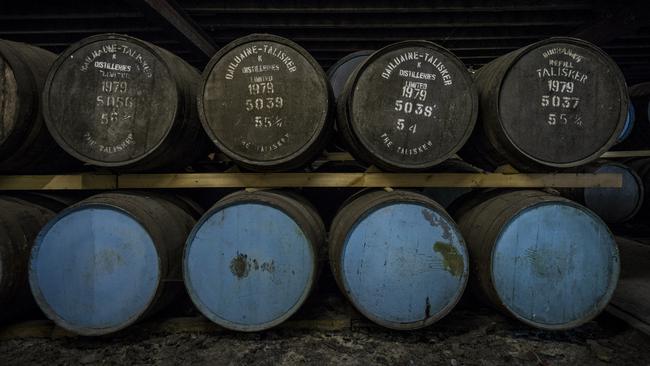Slàinte Mhath! Wealthy investors pouring their money into liquid gold
The wealthy are turning to bottles or even entire casks of scotch whisky as a hedge against inflation.

You’ve heard of turning water into wine, now a group of fund managers has taken that a step further, by planning to turn whisky into gold.
Call it alchemy of a different kind, but whisky funds have sprung up across the globe in recent years, offering investors a hedge against inflation and economic downturns, touting the tipple as one of the most “liquid and secure” assets.
Steve Bailey, managing director of the Whisky Cask Club, a fund launched in Australia by Singapore-based Blair Road Capital, says there is nothing creative about turning scotch into an investment class asset.
Mr Bailey says the numbers speak for themselves: there are 138 distilleries in Scotland and global demand exceeds supply by five times each year.
“It’s a combination of just the stability of it and the supply of it – it’s not that creative in that it’s risky or anything,” he says.
“There’s this same level of supply, but demand is just increasing exponentially. If you get the premiums and the rare whiskies – we’re not dealing with your everyday Dan Murphy-type whiskies – you’re dealing with a real investment that’s going to provide the higher returns.”
Knight Frank, the estate agency, has included scotch whisky in its luxury investment index. It joins art, classic cars, diamonds, wine and watches among the most favoured items in which the ultra wealthy stash their cash.
That doesn’t mean there have not been any ripples. Knight Frank head of rural and luxury research Andrew Shirley says higher-value bottles – those worth more than £5000 ($9020) – had underperformed the broader market last year.
“However, there are now signs of recovery in this sector of the market,” Mr Shirley says.
“The broader market has exceeded both 2019 and 2020 from both a volume/value perspective and also investment growth, so while 2021 has had many ups and downs, bottles of scotch whisky have remained resilient.”

Rare whisky has delivered growth of 540 per cent in the past decade. This compares with other “passion investments” such as art and watches growing at 146 per cent and 63 per cent respectively during the same period, according to the Knight Frank index.
Scottish investment bank Noble & Co says fine and rare single-malt volume has risen 23 per cent, while its value has risen 21 per cent in the nine months to September, with £31m of whisky transacted.
“If current trends continue, 2022 will see a volume increase of 82 per cent over 2021,” it says in its latest whisky intelligence report.
“Our regional analysis shows the auction market having less appetite for Highland whisky, continuing to savour Islay and Speyside malts, and having a growing interest in Lowland whiskies.”
It says younger collectors were driving market demand.
“We see the strongest growth in the £100-£1000 market, where we would expect to see the influence of the younger collector being most prevalent. In this category, volumes to the end of September are up by 30 per cent and value has increased 40 per cent.”
But Noble & Co cautions about growth in the year ahead. “The headwinds of interest rates, declining asset prices in other luxury assets, quantitative tightening and the war in Ukraine could all dampen the appetite of collectors and investors,” it says.
However, market research firm Fact MR says the global whisky market will increase from $US62bn ($93bn) to $US110bn.
“Innovations and developments in the manufacture of alcoholic beverages, as well as a rise in the number of whiskey distilleries throughout the world, are among the primary drivers driving the market’s expansion. Premium and super-premium whiskeys are also in high demand in both developed and emerging markets,” Fact MR says.
The Whisky Cask Club is targeting an annual cash distribution of 10 per cent for its fund, which requires a minimum investment of $US50,000.
It is also offering investors the chance to invest directly in casks – which are fully insured by Lloyds of London and kept in regulated, bonded warehouses in Scotland – rather than the fund, with a minimum investment of $25,000. It has relationships with 40, or about a third, of the distilleries in Scotland.
Mr Bailey says the venture has attracted a mix of investors, including family offices, private investors, financial planners and high-net-worth individuals, with strong interest from the Southeast Asian market.
That said, scotch still has its risks, including the potential of global demand for whisky falling dramatically, not finding a buyer at the end of the hold period – or the pound falling even lower.




To join the conversation, please log in. Don't have an account? Register
Join the conversation, you are commenting as Logout